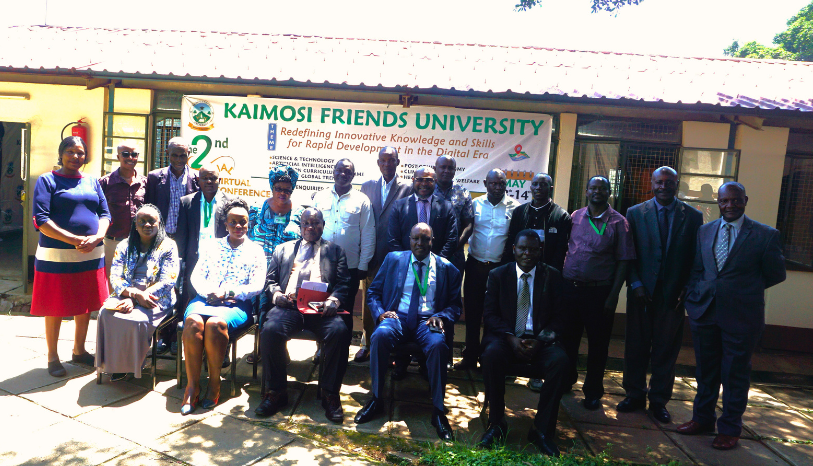
More than 60 papers across eight sub-thematic areas were presented as Kaimosi Friends University marked another significant milestone during its second annual national conference concluded on May 14th, 2024. The two-day virtual conference, graced by distinguished guests including the Director General of NACOSTI, Prof. Walter Oyawa, and the CEO of the National Research Fund, Prof. Dickson Andala, represented by Prof. Elliud Musostsi, witnessed an active participation of over 100 scholars from 29 different universities.
The versatile Big Blue Button platform hosted the conference, featuring a blended launch attended by the KAFU Management Board and faculty at the University’s Old Library. Notably, the conference saw a diverse range of topics discussed, spanning from climate change to artificial intelligence, science, technology, and economic revitalization, among others. Cross-cutting issues in order to accommodate a diversity of scholarly and research perspectives.
The launch of the conference was officiated by the Acting Deputy Vice Chancellor Finance and Development Prof. Maurice Amadalo on behalf of the Ag. Vice Chancellor Prof. Peter Mwita. Also present was the Acting Deputy Vice Chancellor in charge of Academic and Student Affairs Prof. Julius Kipkemboi.
The Deputy Vice Chancellor AF&D observed that 65 papers from a wide variety of disciplines would be presented and these were spread across 8 sub-thematic areas while the participants were drawn from 29 different universities and a few from beyond the national borders. Moreover, the conference attracted 8 professors, over 35 Ph.D holders, and several postgraduate students who were being mentored as co-authors. In total, over 100 scholars participated online.
The Director General of NACOSTI underscored the need for expensive research that can improve local community livelihoods by exploiting the natural resources in the environment. He further emphasized the role of the government in promoting Science, Technology and innovation through high level and action oriented research led by experts in our universities. The facilitative role of NACOSTI as a catalyst for research was
The NRF CEO was happy to join the launch of our 2nd National Virtual Conference. He noted that it was “a pragmatic demonstration of the commitment of the university management and staff to the promotion of high level research. Indeed, the arduous process of gathering data, analyzing it and disseminating findings should be the sacrosanct preoccupation of every scholar.” He noted that the multitude of resources for knowledge creation required such scholarly forums as conferences for us to be able to digest it and get divergent perspectives from other scholars from diverse backgrounds.
The keynote speakers were Prof. Jones Agwata from Machakos University who spoke candidly and insightfully on climate change. He outlined the legal framework, policies, laws and regulations, action plans, research and technology needs, strategies for managing climate change in Kenyan and opportunities for research and innovation. On day two, Prof. Daniel Orwenjo from The Technical University of Kenya discussed the discourse of terror threat notes based on an online corpus from a linguistic perspective which elicited a lively debate.
It emerged that at KAFU, we promote multidisciplinary scholarship and research and this is evident in the range of programmes that we offer hence the rich mix of sub-themes selected for this conference.
As Kaimosi Friends University scholars, we always endeavour to promote research, innovation and outreach through regular seminars, workshops and conferences. Through these academic platforms, we create knowledge, nurture it, disseminate and publish for posterity and for national development. It is for this reason that our mission as a university resonates well with the theme of this conference which is “redefining innovative knowledge and skills for rapid development in the digital era.”
The diverse content and dynamic approaches of the well-researched and peer reviewed papers that were presented for the two days may provide the necessary scholarly impetus to take KAFU to the next level in the field of academic dissemination.
It was expected that the expert deliberations at the conference should culminate in practical solutions to the persistent and recurrent social, economic, educational, environmental and political challenges that plague not only Kenya but also the rest of the African continent and the global arena. These phenomena require urgent and ardent intervention as committed intellectuals.
The representative of the Vice Chancellor thanked the KAFU Council, Management, Senate and the entire KAFU fraternity, our sponsors, partners and regulators for making this event a pleasant reality. He reported that the subsequent conference would be international, given the right commitment and resources.
Participants were grateful to the university and the conference Organizing Committee for organizing a great scholarly forum for dissemination and they looked forward to more similar scholarly intellectually stimulating experiences.
